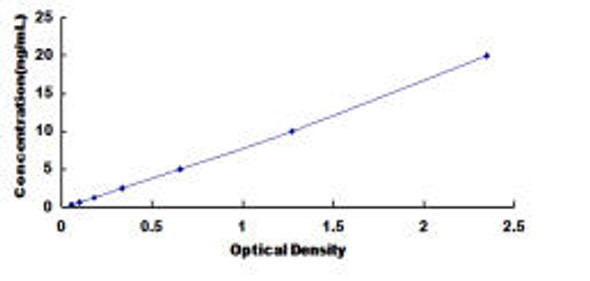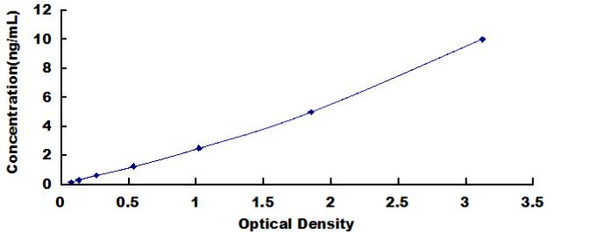Description
Human Tubulin Polymerization Promoting ProteinTPPP / TPPP ELISA
Tubulin polymerization promoting protein TPPP (TPPP) is a protein-coding gene that is a regulator of microtubule dynamics, which plays a key role in myelination by promoting elongation of the myelin sheath. TPPP also acts as a microtubule nucleation factor in oligodendrocytes. It localises to the postsynaptic Golgi apparatus region, also known as the Golgi outpost. This also promotes microtubule nucleations. This is an essential step for elongation of the myelin sheath. In addition, both uniform polarization of distal microtubules and the branching of proximal processes are regulated by TPPP. TPPP also controls microtubule dynamics by promoting tubulin acetylation, which is achieved through the inhibition of HDAC6's tubulin deacetylase activity. TPPP also regulates cell migration through the mechanism of phosphorylation by ROCK1 inhibits interaction with HDAC6. This results in a decrease in the levels of acetylation of tubulin and increased levels of cell motility. Cell proliferation is influenced by TPPP which plays a role in G12-phase transition. In the early stages of mitosis, TPPP plays a role in astral microtubule organisation and mitotic spindle orientation. overall this process is regulated through phosphorylation by LIMK2. TPPP shows magnesium-dependent GTPase activity although the role of the GTPase activity remains unclear. TPPP maintains the integrity of the microtubule network by playing a role in microtubule bundling and stabilization of existing microtubules. Auto-dominant non-syndromic intellectual disability 3 and spinocerebellar ataxia 27 are two examples of diseases caused by TPPP. Sudden infant death syndrome (SIDS) susceptibility pathways and glial cell differentiation are pathways associated with TPPP. Microtubule binding and tubulin binding are related to TPPP, according to gene ontology annotations. TPPP3 is a paralog of TPPP.
| Product Name: | Human Tubulin Polymerization Promoting ProteinTPPP / TPPP ELISA Kit |
| Product Code: | HUFI02920 |
| Size: | 96 Assays |
| Alias: | TPPP |
| Detection method: | Sandwich ELISA, Double Antibody |
| Application: | This immunoassay kit allows for the in vitro quantitative determination of Human TPPP concentrations in serum plasma and other biological fluids. |
| Sensitivity: | 0.375ng/ml |
| Range: | 0.625-40ng/ml |
| Storage: | 4°C for 6 months |
| Note: | For Research Use Only |
| Recovery: | Matrices listed below were spiked with certain level of Human TPPP and the recovery rates were calculated by comparing the measured value to the expected amount of Human TPPP in samples. | ||||||||||||||||
| |||||||||||||||||
| Linearity: | The linearity of the kit was assayed by testing samples spiked with appropriate concentration of Human TPPP and their serial dilutions. The results were demonstrated by the percentage of calculated concentration to the expected. | ||||||||||||||||
| |||||||||||||||||
| CV(%): | Intra-Assay: CV<8% Inter-Assay: CV<10% |
| Component | Quantity | Storage |
| ELISA Microplate (Dismountable) | 8×12 strips | 4°C for 6 months |
| Lyophilized Standard | 2 | 4°C/-20°C |
| Sample/Standard Dilution Buffer | 20ml | 4°C |
| Biotin-labeled Antibody(Concentrated) | 120ul | 4°C (Protect from light) |
| Antibody Dilution Buffer | 10ml | 4°C |
| HRP-Streptavidin Conjugate(SABC) | 120ul | 4°C (Protect from light) |
| SABC Dilution Buffer | 10ml | 4°C |
| TMB Substrate | 10ml | 4°C (Protect from light) |
| Stop Solution | 10ml | 4°C |
| Wash Buffer(25X) | 30ml | 4°C |
| Plate Sealer | 5 | - |
Other materials and equipment required:
- Microplate reader with 450 nm wavelength filter
- Multichannel Pipette, Pipette, microcentrifuge tubes and disposable pipette tips
- Incubator
- Deionized or distilled water
- Absorbent paper
- Buffer resevoir
| Uniprot | O94811 |
| UniProt Protein Function: | TPPP: May play a role in the polymerization of tubulin into microtubules, microtubule bundling and the stabilization of existing microtubules, thus maintaining the integrity of the microtubule network. May play a role in mitotic spindle assembly and nuclear envelope breakdown. Belongs to the TPPP family. |
| UniProt Protein Details: | Protein type:Cytoskeletal Chromosomal Location of Human Ortholog: 5p15.3 Cellular Component: cytoplasm; microtubule; nucleus; perinuclear region of cytoplasm Molecular Function:microtubule binding; protein binding; tubulin binding Biological Process: microtubule bundle formation; microtubule polymerization; positive regulation of protein complex assembly; positive regulation of protein polymerization |
| UniProt Code: | O94811 |
| NCBI GenInfo Identifier: | 28380097 |
| NCBI Gene ID: | 11076 |
| NCBI Accession: | O94811.1 |
| UniProt Related Accession: | O94811 |
| Molecular Weight: | 23,694 Da |
| NCBI Full Name: | Tubulin polymerization-promoting protein |
| NCBI Synonym Full Names: | tubulin polymerization promoting protein |
| NCBI Official Symbol: | TPPP |
| NCBI Official Synonym Symbols: | p24; p25; TPPP1; TPPP/p25; p25alpha |
| NCBI Protein Information: | tubulin polymerization-promoting protein |
| UniProt Protein Name: | Tubulin polymerization-promoting protein |
| UniProt Synonym Protein Names: | 25 kDa brain-specific protein; TPPP/p25; p24; p25-alpha |
| Protein Family: | TPPP family protein |
| UniProt Gene Name: | TPPP |
| UniProt Entry Name: | TPPP_HUMAN |
*Note: Protocols are specific to each batch/lot. For the correct instructions please follow the protocol included in your kit.
Before adding to wells, equilibrate the SABC working solution and TMB substrate for at least 30 min at 37°C. When diluting samples and reagents, they must be mixed completely and evenly. It is recommended to plot a standard curve for each test.
| Step | Protocol |
| 1. | Set standard, test sample and control (zero) wells on the pre-coated plate respectively, and then, record their positions. It is recommended to measure each standard and sample in duplicate. Wash plate 2 times before adding standard, sample and control (zero) wells! |
| 2. | Aliquot 0.1ml standard solutions into the standard wells. |
| 3. | Add 0.1 ml of Sample / Standard dilution buffer into the control (zero) well. |
| 4. | Add 0.1 ml of properly diluted sample ( Human serum, plasma, tissue homogenates and other biological fluids.) into test sample wells. |
| 5. | Seal the plate with a cover and incubate at 37 °C for 90 min. |
| 6. | Remove the cover and discard the plate content, clap the plate on the absorbent filter papers or other absorbent material. Do NOT let the wells completely dry at any time. Wash plate X2. |
| 7. | Add 0.1 ml of Biotin- detection antibody working solution into the above wells (standard, test sample & zero wells). Add the solution at the bottom of each well without touching the side wall. |
| 8. | Seal the plate with a cover and incubate at 37°C for 60 min. |
| 9. | Remove the cover, and wash plate 3 times with Wash buffer. Let wash buffer rest in wells for 1 min between each wash. |
| 10. | Add 0.1 ml of SABC working solution into each well, cover the plate and incubate at 37°C for 30 min. |
| 11. | Remove the cover and wash plate 5 times with Wash buffer, and each time let the wash buffer stay in the wells for 1-2 min. |
| 12. | Add 90 µl of TMB substrate into each well, cover the plate and incubate at 37°C in dark within 10-20 min. (Note: This incubation time is for reference use only, the optimal time should be determined by end user.) And the shades of blue can be seen in the first 3-4 wells (with most concentrated standard solutions), the other wells show no obvious color. |
| 13. | Add 50 µl of Stop solution into each well and mix thoroughly. The color changes into yellow immediately. |
| 14. | Read the O.D. absorbance at 450 nm in a microplate reader immediately after adding the stop solution. |
When carrying out an ELISA assay it is important to prepare your samples in order to achieve the best possible results. Below we have a list of procedures for the preparation of samples for different sample types.
| Sample Type | Protocol |
| Serum | If using serum separator tubes, allow samples to clot for 30 minutes at room temperature. Centrifuge for 10 minutes at 1,000x g. Collect the serum fraction and assay promptly or aliquot and store the samples at -80°C. Avoid multiple freeze-thaw cycles. If serum separator tubes are not being used, allow samples to clot overnight at 2-8°C. Centrifuge for 10 minutes at 1,000x g. Remove serum and assay promptly or aliquot and store the samples at -80°C. Avoid multiple freeze-thaw cycles. |
| Plasma | Collect plasma using EDTA or heparin as an anticoagulant. Centrifuge samples at 4°C for 15 mins at 1000 × g within 30 mins of collection. Collect the plasma fraction and assay promptly or aliquot and store the samples at -80°C. Avoid multiple freeze-thaw cycles. Note: Over haemolysed samples are not suitable for use with this kit. |
| Urine & Cerebrospinal Fluid | Collect the urine (mid-stream) in a sterile container, centrifuge for 20 mins at 2000-3000 rpm. Remove supernatant and assay immediately. If any precipitation is detected, repeat the centrifugation step. A similar protocol can be used for cerebrospinal fluid. |
| Cell culture supernatant | Collect the cell culture media by pipette, followed by centrifugation at 4°C for 20 mins at 1500 rpm. Collect the clear supernatant and assay immediately. |
| Cell lysates | Solubilize cells in lysis buffer and allow to sit on ice for 30 minutes. Centrifuge tubes at 14,000 x g for 5 minutes to remove insoluble material. Aliquot the supernatant into a new tube and discard the remaining whole cell extract. Quantify total protein concentration using a total protein assay. Assay immediately or aliquot and store at ≤ -20 °C. |
| Tissue homogenates | The preparation of tissue homogenates will vary depending upon tissue type. Rinse tissue with 1X PBS to remove excess blood & homogenize in 20ml of 1X PBS (including protease inhibitors) and store overnight at ≤ -20°C. Two freeze-thaw cycles are required to break the cell membranes. To further disrupt the cell membranes you can sonicate the samples. Centrifuge homogenates for 5 mins at 5000xg. Remove the supernatant and assay immediately or aliquot and store at -20°C or -80°C. |
| Tissue lysates | Rinse tissue with PBS, cut into 1-2 mm pieces, and homogenize with a tissue homogenizer in PBS. Add an equal volume of RIPA buffer containing protease inhibitors and lyse tissues at room temperature for 30 minutes with gentle agitation. Centrifuge to remove debris. Quantify total protein concentration using a total protein assay. Assay immediately or aliquot and store at ≤ -20 °C. |
| Breast Milk | Collect milk samples and centrifuge at 10,000 x g for 60 min at 4°C. Aliquot the supernatant and assay. For long term use, store samples at -80°C. Minimize freeze/thaw cycles. |
Fill out our quote form below and a dedicated member of staff will get back to you within one working day!






